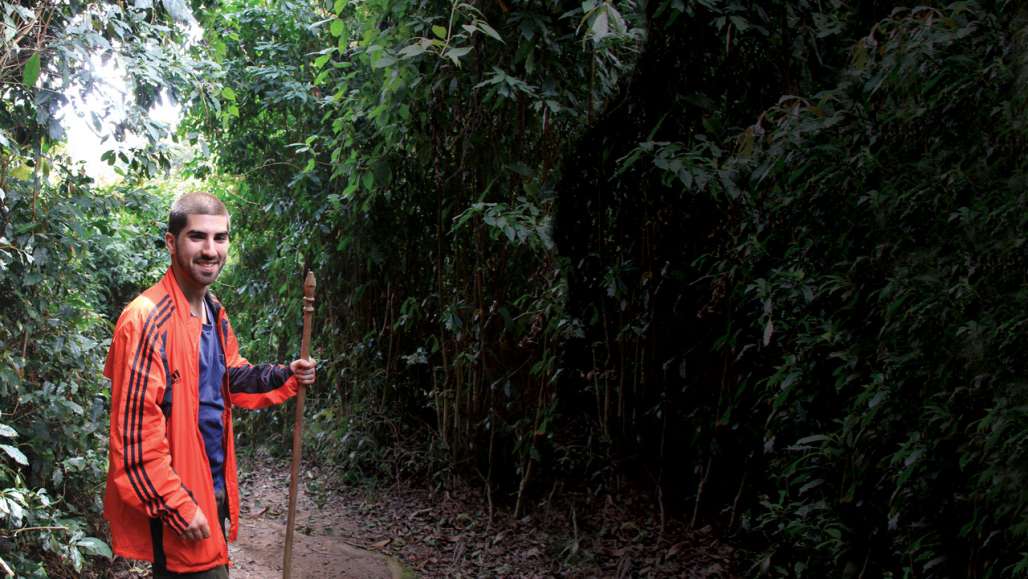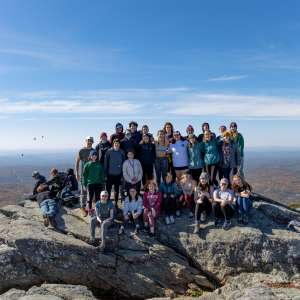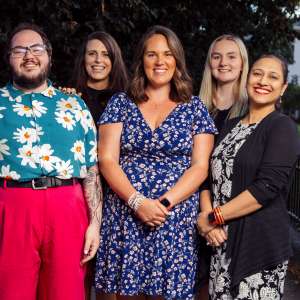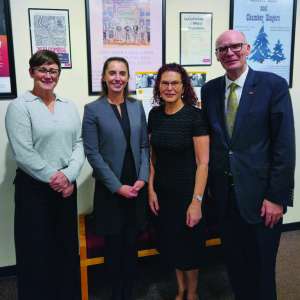Going Global

Keene State students don’t have to wait to graduate to change the world and be changed by it. For many, it starts with study away programs, faculty-led international trips, and service-learning projects. Here are the stories of just a few students.
‘There Was This Stillness’
After spending the spring semester of his sophomore year studying in South Africa, Alex Habibi ’15 was particularly interested in traveling to Rwanda this summer with other Keene State students and Professor Therese Seibert. “I’m interested in colonialism and seeing the effects of it,” he says. “South Africa and Rwanda went down very different paths in 1994. If you’d asked foreign policy analysts in 1993 which country in Africa would see a race war/genocide, they probably would have said South Africa. The international community considered Rwanda to be of marginal concern.”
The trip combined two weeks of touring Rwanda and two weeks of participating in the Peace-Building Institute, a conference for students facilitated by the nonprofit organization Never Again Rwanda. Habibi also had a chance to climb Mount Kabuye with another Keene State student, a Rwandan friend, and two local boys. He speaks about that experience here:
When we got to the top, there were a lot of holes dug in the ground. Immediately, I thought they were trenches. It turned out that the top of that mountain was a command post during the civil war for the Rwandan Patriotic Front, now the governing party. I saw a small amount of metal fragments; I assumed they were shrapnel or bullet casings. Yes, there were trenches right there, and no government markers. It wasn’t part of a sanitized museum or anything like that.
It just really spoke to the freshness of the conflict. The Patriotic Front invaded in 1990, the genocide was in 1994, and I was born in 1993, so it’s fresh and right there. And even at some memorials, like in the Ntarama Church, there are still blood stains on the walls, there’s still the lingering smell of death. I don’t know if it was my mind conjuring up that smell or if it was actually there. It’s almost like there’s an air about it. Even though there wasn’t a memorial marker on Mount Kabuye, and there are no skeletons or physical remains, you could almost feel that something had happened there. There was this stillness. Something didn’t feel right.
Read an interview with Alex Habibi
– Alex Habibi
‘I Am Because We Are’
Kelly Christianson ’15 spent six weeks during the summer of 2013 in a service learning program in Cape Town, South Africa. While there, she took courses and worked for six weeks at a children’s home, where she organized a community garden project. “It was one of the best experiences of my life,” says the triple major, who hopes to teach in post-conflict countries. She describes her experiences with her host family:
I got to stay with a Muslim family – a mom and dad, four children, and a granddaughter. They were absolutely fantastic. It was Ramadan when I got there, so I got to fast with them. I learned a lot about community. I’m from East Longmeadow, Massachusetts, the Springfield area, and there’s no community there as tightly knit as the one in Bo Kapp. I’ve never experienced living in a neighborhood where people care about their neighbors. So I thought a lot about my experience with Ramadan. The entire Muslim community came together, and each family would make one dish of food. They would make enough for the entire community. Everyone would make a different dish, and then you’d go from house to house exchanging food, so that when it was time to eat after the day was done, every family had something the entire community had made. Ubuntu, the Xhosa word for “I am because we are,” means: We are all in this together. You have what your neighbor has. If you have enough to share, you share with everyone. Even if you don’t have enough to share, you share with everyone.
– Kelly Christianson
Asking the Big Questions
Organizers. Planners. Budgeters. Managers. Mentors. Translators. Teachers. As student leaders for Keene State’s 2013-14 international service trip to Bocas Del Toro, Panama, Cameron Haggar ’14 and Kya Roumimper ’15 took on a number of roles. The group of 15 students plus Coordinator of Community Service Jessica Gagne Cloutier helped out at a school for indigenous children, creating curriculum plans, painting a cafeteria and library, and building a baseball field. While the service was a worthy undertaking, Haggar and Roumimper agree that the real value of such trips comes in the education Keene State students get – the broader understanding of themselves and the world that they bring back.
Our job was to get our team, both at a surface level and a deeper level, to look at the bigger questions. You look at social justice issues, and you start questioning the systems in place that allow those issues to be relevant. You question a lot of things on a more personal level, like happiness and what it means to be happy. Any time you’re going into another community and doing work, you’re coming from a place of privilege, so you’re forcing yourself to step out of your comfort zone and to change your way of thinking. No matter where you go or what you’re doing, you’re going to come back more changed than the people you help.
– Kya Roumimper ’15
I think simpler now. I don’t try and plan things; I try to go with the flow and be happy with what I have. Down there, life was so simple, and I didn’t worry about anything. My mind was free. I found true happiness. That’s what was most life-changing for me. I think this trip, leading the participants, having them lead me, showed me a whole different perspective on myself, a whole different perspective on life in general and the meaning of true happiness.
– Cameron Haggar ’14
‘We Don’t All Need to Be the Same’
“When you think Ecuador, you think hot,” says Leighanna Moore ’15, but that’s not necessarily the case. While on a travel-study course in the South American country through Keene State’s Honors Program, Moore visited a day care center in the Andes Mountains. “It’s a cement building with cement floors,” she says. “There’s nothing carpeted, nothing warm, and the kids were all wrapped in their little coats for the whole day.” The day care center lacks other amenities as well, including sufficient space for the number of children served (babies nap in “bunk cribs”) and additional safety features. But the most immediate issue, Moore learned, is that the center is stuck in a cycle of moving from one borrowed building to another. When she talked with staff, she learned they are working to raise $10,000 for a permanent facility in which the children could flourish. It would include a playground and room to wander outside, she says. “In Ecuador, they’re all about being self-sustaining and connected to the earth. They want to teach their children those values.”
“These kids were so amazing, speaking two to three languages, yet they’re all crammed into a cement box,” she says. “Through my education classes here at Keene, I really have become aware of how much stimulation is necessary for a child’s development, so I thought, wouldn’t it be great if I could help these children learn and grow?”
On her return to Keene, Moore, a double major in elementary education and health sciences, set up an account on a crowd-sourcing website and raised $500 for the day care center by spreading the word through Facebook and approaching friends and family. “The Ecuador experience really gave me a perspective on how other cultures are different than ours,” she says, “and it’s OK. We don’t all need to be the same.”





